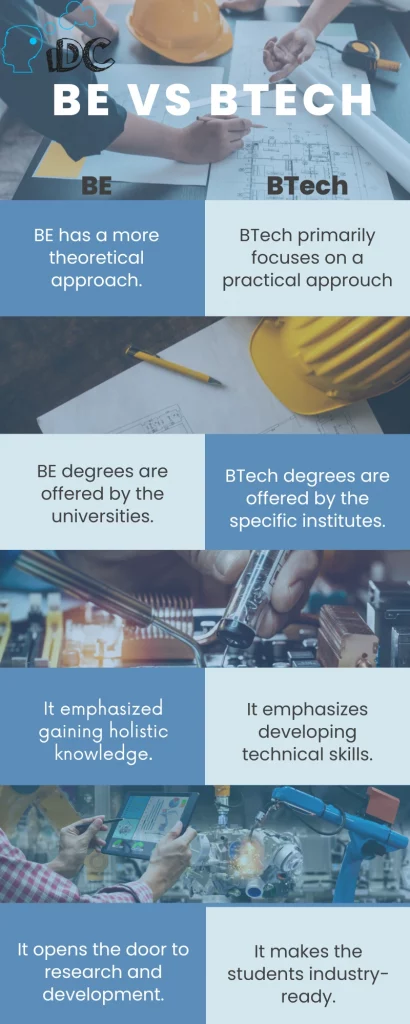When choosing an engineering degree, students are often confused about what to choose between BE and BTech courses. The confusion arises due to the lack of clarity about the difference between BE and BTech. While both terms are commonly associated with engineering degrees, there exists a notable differen ce between the two. BE stands for Bachelor of Engineering, whereas BTech stands for Bachelor of Technology.
Interesting Fact!
According to a report published by Statistica, about 10,81,000 students enrolled in computer science engineering in the academic year 2021-22!
The difference between BE and BTech primarily arises from the variations in educational systems across different countries and institutions. In general, the difference lies in the approach and emphasis of the respective degrees. By diving deeper into the difference between BE and BTech degrees, one can navigate the vast field of engineering with greater clarity and precision.
Topics covered
What is a BE degree?
BE, which stands for “Bachelor of Engineering”. It is an undergraduate academic degree typically awarded in the field of engineering. It signifies the completion of a four-year program that provides students with foundational knowledge and skills in engineering principles and practices. The BE degree prepares graduates for entry-level engineering positions and serves as a stepping stone for further specialization or advanced studies in engineering disciplines.
Features of a BE Degree
Some of the important features of a BE degree include
- It provides a strong foundation in engineering principles, theories, and practices.
- It equips students with technical skills relevant to their chosen engineering field, such as computer programming, design, analysis, and problem-solving.
- It often offers various specialization options, allowing students to focus on specific areas of engineering.
- It generally includes hands-on laboratory work and practical training, providing students with real-world experience and exposure.
Want to know more about BE course? Read our blog Bachelor of Engineering for a better insight.
What do we call a BTech degree?
A BTech degree, also known as a Bachelor of Technology, is an undergraduate academic degree awarded in various technical fields. It is usually focused on the application of technology and practical skills. BTech programs often emphasize hands-on training, technical knowledge, and problem-solving abilities. This degree is offered in disciplines such as engineering, information technology, computer science, electronics, and telecommunications, among others.
Features of a BTech Degree
Some of the salient features of a BTech degree include
- It emphasizes technical knowledge and practical skills in a specific field.
- It often has a strong emphasis on practical and hands-on learning, allowing students to gain real-world experience and apply theoretical concepts.
- It offers various specialization options within the chosen field.
- It is designed to align with industry needs and requirements, ensuring graduates are well-prepared for careers in their chosen fields.
Looking for BTech courses after the 12th? Read our blog All You Need to Know About Top BTech Courses After 12th for more details.
BE vs BTech: The Comparison You Were Looking For
After understanding the basic definition of BE and BTech degrees, now comes the right time to observe the difference between BE and BTech. The importance of understanding the difference is that it will bring clarity to your thoughts and will help you make the right decision.
Here are the basic differences between BE and BTech that one must know beforehand:

| BE | BTech |
| BE has a more theoretical approach. | BTech primarily focuses on a practical and application-oriented approach. |
| In general, BE degrees are offered by the universities. | In general, BTech degrees are offered by the specific institutes. |
| Pursuing a BE degree further opens up the door to pursuing higher education. | BTech being a practical course, focuses on placement opportunities. |
| It emphasized gaining holistic knowledge. | It emphasizes developing technical skills. |
| It opens the door to research and development. | It makes the students industry-ready. |
Now, let’s have a comparison on the basis of some other factors that will surely help you gain a clear understanding of the difference between BE and BTech.
BE vs BTech: Job Prospects and Industry Perception
You’ll gain more clarity if you compare the future prospects of both courses simultaneously. You can align your choice according to the future path that you have chosen for yourself. There is a slight change in the educational focus and curriculum structure of both courses.
| BE | BTech |
| BE offers you a wide range of engineering fields to choose your career in along with higher educational opportunities. | BTech is slightly inclined towards technology-related industries. |
| It gives you an opportunity to work in the core engineering roles. | It gives you an upper hand in the world of technology. |
| BE opens doors to secure jobs in government and public sectors. | It can open doors to secure jobs in the IT services and consulting industries. |
BE vs BTech: Average Salary
We have always been told to focus on earnings with learnings. They both complement each other. The salary becomes an important factor of comparison as it has the potential to be the deciding factor.
| BE | BTech |
| The average salary for a BE graduate fresher in India is somewhere around INR 2.5 LPA. | The average salary for a BTech graduate fresher in India is somewhere around INR 3-8 LPA. |
Please note that the above-mentioned figures are totally research-based. The average salary figures might change depending on the work experience, location, and the company.
BE vs BTech: Professional Societies and Affiliations
Let’s now try to draw the line of comparison between BE and BTech based on professional societies and affiliations.
| BE | BTech |
| Professional engineering organizations like the Institution of Engineers (India) and the Institution of Engineers and Technologists (IET) are frequently affiliated with and partnered with by BE programs. | BTech graduates could have the chance to join and take part in organizations or groups for professionals in their particular areas of technology. |
| Some professional societies provide recognition and certifications that can enhance the credibility and marketability of BE graduates. | BTech programs frequently have close relationships with business partners in the engineering, manufacturing, and technology sectors. |
BE vs BTech: What to choose?
I hope that you have a clear understanding of the difference between BE and BTech. We compared these two degrees on several parameters. Let me tell you that these two degrees are one of the most-sought degrees across the nation. Thousands and lakhs of students are competing every year to grab a seat in their dream engineering colleges.
You should pursue BE if…
- You have a passion for learning
- You want to have the opportunity of gaining holistic knowledge.
- You are looking to pursue a career in government and the public sector.
You should pursue BTech if…
- You want to become an industry-ready person.
- You want to have specific knowledge of technology and related stuff.
- You are looking to pursue a career in IT and consultancy services.
Wandering about BTech? Check out the Top BTech Colleges in India!
Conclusion
I hope that you have now a clear understanding of the difference between BE and BTech. Always remember that nothing is perfect, it is you who have to decide what suits you well. We have provided you with the basic definition of BE and BTech courses. We have also compared BE and BTech degrees based on certain parameters. Lastly, we have also mentioned the average salary for both courses in India.
iDreamCareer helps those who are confused about choosing the right stream at the right time. Aspiring students can avail of our counseling services to make an informed decision about their future. Don’t hesitate any longer! If you are in class 10th and want to know how to select the right subject combination, explore iDreamCareer’s subject or stream selection guidance program. If you’re in 12th grade and uncertain about post-PCM subject, check out iDreamCareer’s Course and College selection guidance page! Last but not least, Undergraduate and Postgraduate students can also take their first step toward their dream careers by seeking guidance on what after graduation. Next can be you!
Useful Links:
- Top Engineering Colleges in India
- Best Private Engineering Colleges in India
- SAAT Exam 2024
- List of engineering courses
- PESSAT Exam 2024
- Aeronautical Engineering Colleges in India
- Top Engineering Colleges in Bangalore
- Best Engineering Colleges in Tamilnadu
- Aerospace Engineering Colleges in India
Difference Between BE and BTech: FAQs
The main difference lies in their educational focus. BE programs have a more theoretical approach, while BTech programs emphasize practical application and technical skills.
While both degrees are in the field of engineering, their curriculum and approach may vary. BE programs often have a broader scope, while BTech programs specialize in specific branches of engineering.
BE degrees are generally offered by universities, while BTech degrees are commonly offered by technical institutes or colleges.
Yes, BE graduates can pursue higher education such as Master’s or Ph.D. degrees to specialize further in a specific engineering field or explore research and development opportunities.
BE degrees are often considered more suitable for careers in research and development, as they provide a strong theoretical foundation and emphasize critical thinking and innovation.

Sushant, an accomplished content writer at iDreamCareer, has dedicated his life to the pursuit of writing since childhood. Having earned his education at the prestigious University of Delhi, he possesses a profound understanding of both arts and science in the field of education. Leveraging his professional experience, Sushant brings a fresh perspective to analyzing emerging trends in the realms of writing and education. His youthful mindset, coupled with a positive outlook, is geared towards enlightening students through the impactful delivery of wisdom and knowledge.


















